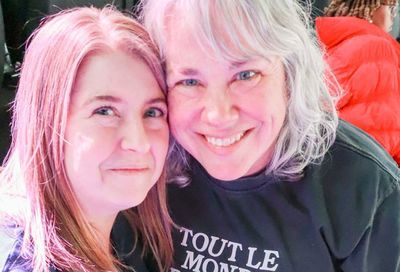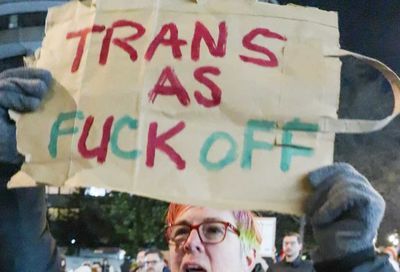Gavin Grimm Warns of Attacks on LGBTQ Rights: “Texas is All of Us”
Trans activist urges students to be vigilant in defending their rights as politicians seek to whittle away LGBTQ protections.

Gavin Grimm warned LGBTQ high schoolers and their allies at a Saturday town hall meeting to be vigilant about defending any progress that schools have made on LGBTQ rights.
Speaking at Montgomery County Public Schools’ Pride Town Hall gathering at Bethesda’s Walter Johnson High School on Saturday, Grimm — a transgender advocate who was the plaintiff in a key court case involving his ability to access the boys’ restroom at his Virginia high school — told attendees that, even in liberal jurisdictions like Montgomery County, LGBTQ students can find themselves on the defensive.
“When you’re getting into places like a school system with a lot of really well-meaning [supporters], people who are in that circle can feel really defensive or called out if you’re saying, ‘This is great, but you’re not doing enough,'” Grimm said.
He also acknowledged that Montgomery County students enjoy a more accepting environment than the one he experienced as a student at Gloucester High School, located in Virginia’s rural Middle Peninsula region.
The gathering, which included 11 workshop discussions ranging from creating LGBTQ-inclusive curricula to responding to anti-LGBTQ bias in schools, drew nearly 300 students, parents, and teachers to Johnson High School.
Grimm urged attendees not to be complacent about the rights or protections they currently enjoy. He said that even people who live in more liberal jurisdictions should not casually dismiss what is happening in conservative states where anti-LGBTQ laws are being passed at a rapid-fire pace.
As an example, he pointed to Texas, which has passed a transgender sports ban and a bill allowing social workers to refuse to serve LGBTQ clients, and where state officials are currently investigating parents of transgender children for “child abuse” if a minor is believed to have received gender-affirming medical care, noting that the Lone Star State shouldn’t be thought of as far away, according to The Washington Post.
“Texas is all of us,” he said. “Even in this area, we have no idea that leadership won’t change, and the children in this school and the people in this school and in this community aren’t therefore in danger.”
Grimm recalled his own story of becoming involved in activism after being barred from the boys’ restroom by the Gloucester County School Board — despite having previously used the boys’ restroom, without incident, for seven straight weeks prior to the school board’s vote. With the backing of the American Civil Liberties Union, he sued the school district.
“I didn’t do what I did because I was brave and because I was innately powerful,” he said. “I did what I did because, regardless of how I felt about myself, I believed in what I deserved. … My position was one of justice, not one of self-empowerment or confidence.”
After years of legal wrangling, Grimm’s lawsuit eventually made its way to the 4th U.S. Circuit Court of Appeals, which ruled in his favor, finding the school district had discriminated against him on the basis of both sex and gender identity.
The school district appealed the decision to the U.S. Supreme Court, which declined to hear the challenge and allowed the circuit court’s ruling to stand.
While warning of the need for vigilance, Grimm also spoke about positive developments in recent years for LGBTQ students, and the larger trend of growing acceptance, however slowly it might be happening, and despite occasional instances of regression, often fueled by backlash from social conservatives.
“Every single year we have more people and we have more excitement and we have more young people willing to demand what they know that they deserve,” Grimm said. “Even in the states where we’re having our agency, our personhood challenged and banned and restricted, people are not standing for this broadly.
“In every single corner of this country where this legislation is being passed, you’ll find an ally mom or a couple of youth with a couple of signs. You’ll find somebody standing up and saying that it’s not right.”
Support Metro Weekly’s Journalism
These are challenging times for news organizations. And yet it’s crucial we stay active and provide vital resources and information to both our local readers and the world. So won’t you please take a moment and consider supporting Metro Weekly with a membership? For as little as $5 a month, you can help ensure Metro Weekly magazine and MetroWeekly.com remain free, viable resources as we provide the best, most diverse, culturally-resonant LGBTQ coverage in both the D.C. region and around the world. Memberships come with exclusive perks and discounts, your own personal digital delivery of each week’s magazine (and an archive), access to our Member's Lounge when it launches this fall, and exclusive members-only items like Metro Weekly Membership Mugs and Tote Bags! Check out all our membership levels here and please join us today!

























You must be logged in to post a comment.